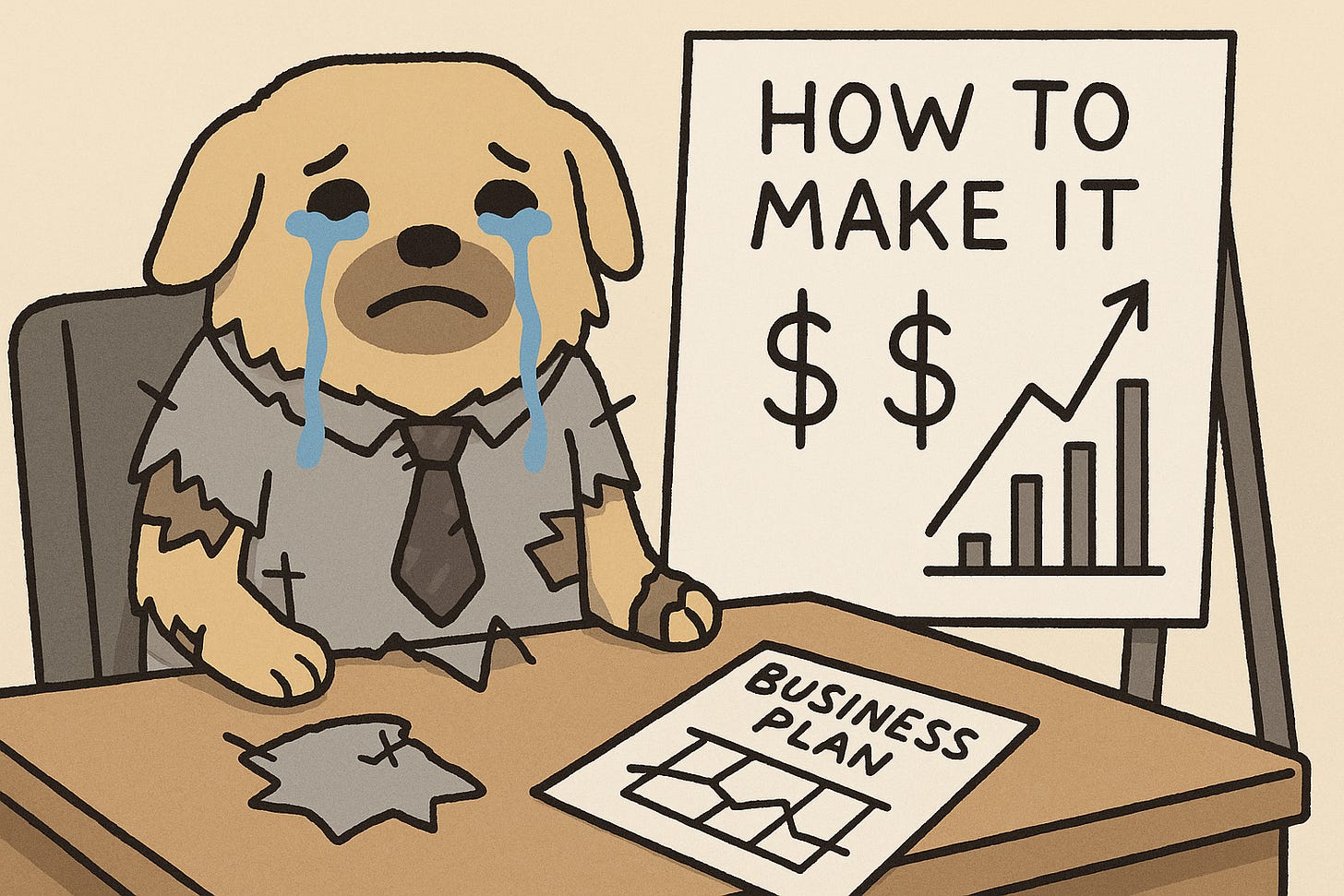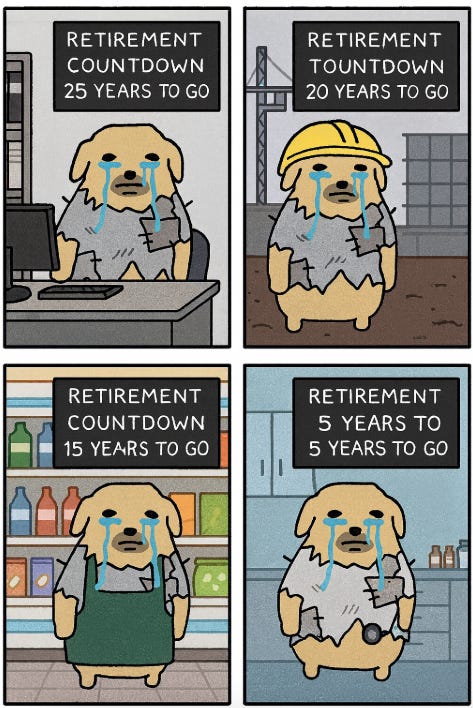Buy your freedom first
The best career advice I ever received
Many, many years ago, I started my first grown-up person job.
I was your typical hyper-ambitious, but pretty stupid new graduate. I’d be the first in and the last to leave. I’d spend my evenings and lunch breaks on spreadsheets, PowerPoints, and emails.
If I wasn’t doing “real” work, I’d be trying out every influencer-promoted side hustle known to man. Amazon dropshipping, bank account switching, stoozing, sportsbook arbitrage, or getting scammed importing fake memory sticks from China.
I was obsessed with “making it” and being as successful as possible.
In the huge open-plan office of MegaCorp, across the desk from me sat this old guy.
I say old, but he was probably about 50 — which, tbh, now I’m older, doesn’t feel remotely old at all.
His name was Peter.
Peter had a reputation for being hard to talk to, hard to get hold of, and even harder to work with.
But he was exceptionally talented at what he did. He could manipulate numbers and spreadsheets like no one I’ve ever seen, and his forecasting skills were super-nerd magician-level accurate.
He could literally see the future through the numbers.
For the first three months, he barely said a word to me. I’d maybe get a grunt in my general direction when I said good morning.
I think if he’d been born 30 years later, he would have been one of us.
Time went by, and things were going well. I’d caught the attention of my boss’s boss and was doing some project work for him on the side, on top of my day job.
Others in the department caught wind that I was pretty good at Excel and began asking if I could do work for them too. Eager to impress, of course, I said yes.
Peter, who had slowly started to warm to me, didn’t share the same enthusiasm for side projects. At first, I thought he was lazy, but as the constant stream of extra requests piled up and none of it seemed to have any tangible output — I started to understand why.
One particularly stressful day, after I’d spent all weekend modelling every possible scenario under the sun and prepping hundreds of backup slides, I had a slight emotional outburst. The agenda had been changed the week before, and I, being the lowest rung on the corporate ladder, wasn’t informed.
Peter saw this and, for the first time ever, began to open up to me. He leaned over the desk and said, “Buy your freedom first.”
He didn’t elaborate further.
I didn’t fully grasp what he meant at the time. But the further I went in my career, the more I began to realise it.
In megacorps, there are many lost souls floating around. They’re everywhere — in every department and every team.
I’d always been a bit perplexed by why they seemed so jaded, so burnt out, so miserable.
When you’re new, you just think they’re just grumpy old people. But they’re not. They were just like you once too. They joined with a fire burning deep within them. They wanted to change the world. They wanted to be the best they possibly could be. But that flame was slowly extinguished by bureaucracy, politics, and the hidden realisation that the work they were doing wasn’t truly meaningful.
You can only lie to yourself about this for so long.
They’re trapped in golden handcuffs, earning just enough to have an above-average life, but never enough to buy their way out.
It’s a comfortable kind of misery, the hardest kind to escape
Starting fresh anywhere else, or pursuing a career they might actually enjoy, feels like a huge risk — and almost always means a large pay cut.
So they stay. Trapped. Counting down the years until retirement or heart attack, as the light inside their soul slowly fades.
One Monday, Peter didn’t show up for work.
The next Monday, he wasn’t there either.
The Monday after that, we found out he’d fallen into a coma.
And the Monday after that, he was gone.
Things were sad for a bit. We attended his funeral, did a fundraiser for his wife and family, and installed some benches at the local park in his memory.
But the work continued. The interviews began, and two months later someone new was sitting in that seat across the desk from me — as if Peter had never even existed.
Buy your freedom first.
He was right.
It’s only really now, a decade plus later, that I’m starting to understand what that actually means.
So many people pour their life and soul into their work. But their work doesn’t pour its soul back into them. For the majority, you are just a number on a screen, a salary in a budget, an email on a list.
Buying your freedom isn’t about making millions of dollars.
It’s about buying agency and authority over your own life.
You don’t need millions for this. You just need a big enough buffer to comfortably take more risks — an emergency fund, a few years’ salary in investments, etc.
And I don’t mean taking risks like trading on 50x leverage.
I mean if you despise your job, it’s taking the risk of finding a new one, or starting a business, or just taking some time off to explore what you truly enjoy — and working extremely hard to turn that into a career.
It’s having a financial buffer so that, if need be, you can take a few months or even years off to explore the things in life that really, genuinely matter.
Because one day you’ll have kids, and you’ll want to be there to take them to the park, to see their first steps, to attend sports days.
Your parents will grow old and sick, and you’ll want to be there to care for them in their final years.
Old friends will reach out asking to reconnect, and you’ll want the time and energy to maintain those connections.
And whilst the vast majority of people on this planet go through these beautiful or heartbreaking experiences whilst also working full-time jobs, if you buy your freedom first, you have the ability to consciously design your life around either maximising the joy of these moments or reducing the likelihood of pain or regret.
So if you’ve done well recently gambling on magical internet money, or you’ve received a massive airdrop…
Please, please, please don’t just gamble it all away on perps, memecoins or take it to the casino.
You’ve been handed a lifeline that you probably don’t appreciate just yet — but you will in the future.
Buy your freedom first. You are luckier than you think you are.




ty for this happy